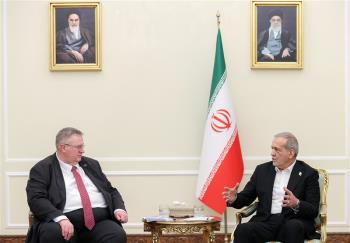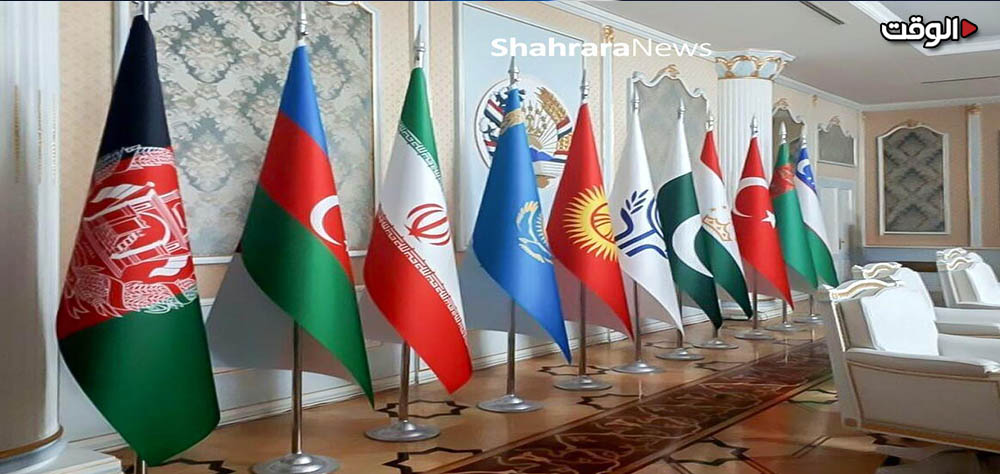Alwaght- With the geopolitical changes in the world and emergence of new economic groupings, regional organizations begin to captivate attention more than any other time. Having held various summits within the framework of Shanghai Cooperation Organization (SCO) and Conference on Interaction and Confidence-Building Measures in Asia (CICA) over the past two years to boost cooperation and escape the harmful consequences of the global crises, Iran and regional countries have this time are set to convene under Economic Cooperation Organization (ECO) to expand their inter-group business ties.
Iran is hosting 28th ECO foreign ministerial-level summit in the city of Mashhad on December 3 and 4.
According to Iranian Foreign Ministry's spokesman Ismail Baghaee, senior ministers and other officials of ECO nations along with managers of specialized regional organizations of this bloc, as well as secretary-generals of some multilateral economic organizations will take part in this important regional summit.
Pointing to the role and place of this regional bloc in expansion of economic partnership among the regional nations, Baghaee said that the ECO is the oldest regional economic arrangement of the developing countries that has on its agenda improvement of regional economic development. Iran chairs the bloc in 2024.
Ahmad Masoumifar, head of the Iranian foreign ministry's representation in the north and east of the country, commented on the details of the meeting, saying: "The ministerial meeting will be held on Tuesday, and the day before that (Monday), a meeting of senior officials will be held to prepare the agenda, and at the end, a statement will be issued under the title of Mashhad statement. In the foreign ministerial meeting, where the Council of Foreign Ministers is the most important decision-making body for ECO, the last year's program will reviewed and plans for the next year will be laid."
The last Iran-hosted ECO Council of Foreign Ministers meeting was held in 2013, and holding its 28th meeting in Mashhad is an opportunity for Iran and Khorasan Razavi province to introduce the economic, cultural, and tourism capacities of Iran and Mashhad to the attending countries.
ECO's weak role in expanding regional cooperation
ECO is a regional economic organization that was first established in 1960 by three countries of Iran, Pakistan, and Turkey under Regional Cooperation for Development Organization (RCD). In 1992, Afghanistan, Turkmenistan, Kyrgyzstan, Uzbekistan, Kazakhstan, Tajikistan, and Azerbaijan joined ECO.
The ten ECO member countries, with an area of 8 million square kilometers and more than half a billion population, have developed close interaction over the years. Transport, transit, trade, and energy are the three priorities for cooperation among the members, but basic structures for cooperation in other economic areas have also been established among the members.
Although ECO has been existing for six decades, its members have not been able to utilize each other's domestic capacities to develop economic cooperation as they should have.
Currently, the total GDP of ECO members is $1.8 trillion, the total foreign trade of these countries is $1.2 trillion, and their intra-regional trade is $100 billion.
The most important export products of ECO countries are energy, plastics, minerals, machinery, iron and steel. If bilateral and multilateral cooperation between ECO members expands, the level of intra-regional trade will undoubtedly upgrade.
On the other hand, foreign direct investment in member countries is only 1.7 percent of the total world foreign direct investment, which is far below the expectations and economic potentials of the region.
Despite the limited level of trade, over the past two decades, member countries have worked together to accelerate regional development through joint efforts, including several projects in the sectors of energy, agriculture, trade, transport, disaster risk reduction, environment, health and drugs control.
This organization was expected to play a role similar to the European Union for the countries of the region with the membership of the former republics of the Soviet Union, but the level of trade among the member states in untenable and their bilateral trade hardly goes beyond $5 billion at best.
ECO member countries import a large part of their goods from countries outside the region, while these goods can also be found in neighboring countries and they can obtain them at the lowest cost.
According to economists, by accelerating the implementation of regional agreements, including the ECO Trade Agreement, the Visa Facilitation Agreement, and the Foreign Investment Promotion and Support Agreement, member countries can overcome existing challenges.
If governments reduce their customs tariffs, there will be great attractions for economic actors and investors in the region to strengthen their relations with other member countries.
Energy and transit the strong points of ECO
Given their extensive energy capacities, large market for abundant human resources, unique geopolitical characteristics, and other economic characteristics, the member states can be complementary markets for each other's goods.
Most countries in the region have huge oil and gas reserves that can meet the needs of countries that do not have these resources, such as Turkey and Pakistan, and this will significantly increase the volume of economic relations between members.
On the other hand, ECO is located at the crossroads of the East-West and North-South corridors, which can control the economic pulse of the region by developing its infrastructures.
Using the capacity of rail corridors for ECO trade development was raised at the organization's meeting in Tashkent in February 2023 by Iran's late Foreign Minister Hossein Amir-Abdollahian, an idea that met welcome of other members.
The Islamabad-Tehran-Istanbul railway route, which connects the subcontinent to Europe, will certainly have a significant impact on the development of East-West relations and will highlight ECO's position in major transit equations of the world's economic powers.
In addition, these railway routes will contribute significantly to the development of transportation and increase national incomes in the region. The Pakistan-Iran-Turkey railway corridor, which had not been implemented for many years, was launched in January 2022 after a 10-year hiatus. According to the agreements made between the three countries, the railway is scheduled to operate regularly every week.
The North-South Corridor of Iran was launched two years ago, providing a good opportunity for ECO countries to transport their goods to the Indian Ocean and the Persian Gulf. In addition to developing relations among ECO countries, this will also help reduce costs. Central Asian countries have welcomed this Iranian corridor, and with the development of infrastructure in the future, we will witness the development of relations between the countries of the region and Iran.
Another important point is that the ECO member countries are on the path of China's Road and Belt Initiative (RBI), and with the implementation of this global project, the level of business interaction between countries will increase and they can play an important role in relations between East and West.
Having in mind that due to the war in Ukraine, European routes through Russian territory have been closed down, alternative routes in the region will become more important than ever. China has more than $600 billion in trade volume with Europeans, and most of its exports and imports to European markets were used to be carried out through the Russian territory. Now, the Chinese are looking for alternative and less expensive routes, and ECO members, especially Iran, are the best option, and Beijing officials count on these countries. The RBI area, or New Silk Road, which includes a population of 4 billion, will lead to the creation of extensive employment in countries located along this corridor, and they will earn a lot income from this project.
With this in mind, strengthening regional corridors will have a major impact on the trade ties of countries, and if ECO members are willing to strengthen their relations, they can meet some of their needs from each other. Given that sea routes are more risky and air routes are also costly, land and rail corridors will attract global attention in the future.
Therefore, ECO members can transform the region into a global trade hub by linking the East-West corridor with the North-South corridor.
Mashhad summit, an opportunity to introduce Iran's unique diversity
With Mashhad hosting the ECO summit, Iran can use the opportunity to introduce its tourism capacities and economic infrastructure especially in the Khorasan Razavi province which is neighbor to Afghanistan and Turkmenistan.
Highlighting the serious resolve of the government to hold important international events in other provinces, the foreign ministry spokeman said the aim is to provide an opportunity for the participants to get familiar with the economic and cultural capacities of various Iranian regions.
As a border crossing and located on the North-South corridor and having access to Central Asian markets, Khorasan Razavi plays an important role in the development of North-South trade, security and stability, infrastructure development, investment, and job creation.
The fact that the Chinese are trying to build their mega project of the New Silk Road is because of the role that these railway routes will play in the future of global trade and the countries along these corridors will be given more focus than others.
Opening new political cooperation chapter in ECO
The ECO meetings provide an opportunity for the member states to interact on regional and international developments.
Though ECO is an economic body, since many of its members share views on security and political issues and threats and also since they have cultural and religious commonalities, Mashhad meeting in the middle of the escalating regional tensions opens the door for the attendants to discuss political issues. Actually, this meeting reflects the shared views of the member states on Gaza, Lebanon, and Syria crises.
Currently, the war in Gaza is a point of political commonalities of the ECO members, and the Mashhad summit is a good opportunity to use the framework of this regional meeting to condemn the crimes of the Israeli regime in Palestine and to consider measures to counter Tel Aviv leaders' warmongering.
Naturally, as international pressure, especially from Islamic countries, griws on the criminal Israeli regime, the ground will be made for stopping Gaza war.
Additionally, ECO can substantially contribute to settlement of potential crisis in Afghanistan to pave the way for return of Kabul to the world community with return of stability.
In general, it can be said that ECO meeting in Mashhad is a good opportunity for Iran and the members of the bloc to transform the region into a world trade hub using their internal capacities, especially their transit and energy sectors.



























